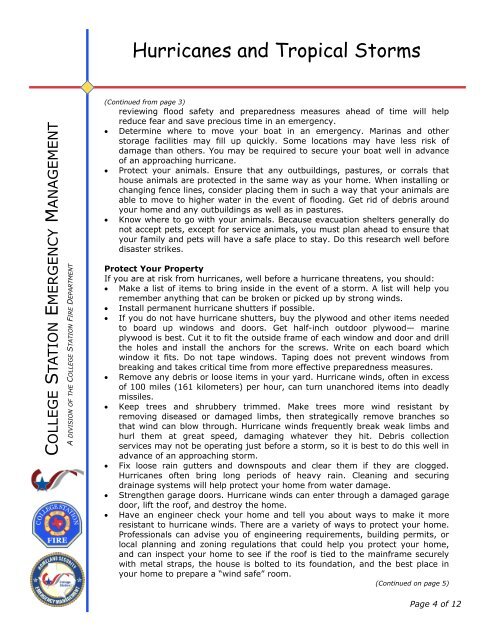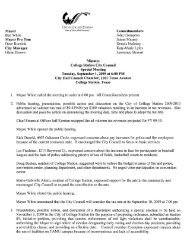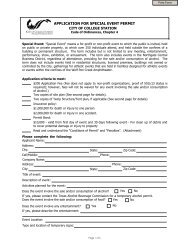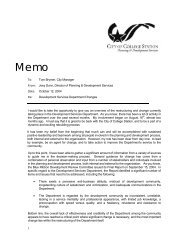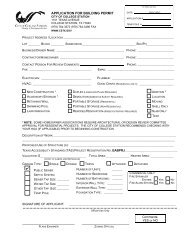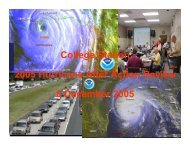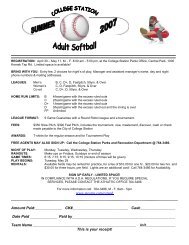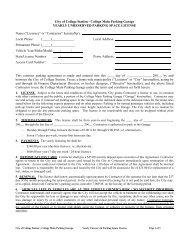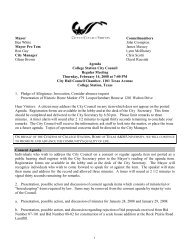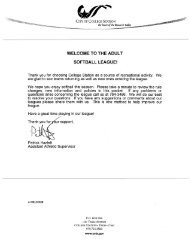Hurricanes and Tropical Storms - City of College Station
Hurricanes and Tropical Storms - City of College Station
Hurricanes and Tropical Storms - City of College Station
Create successful ePaper yourself
Turn your PDF publications into a flip-book with our unique Google optimized e-Paper software.
<strong>Hurricanes</strong> <strong>and</strong> <strong>Tropical</strong> <strong>Storms</strong><br />
COLLEGE STATION EMERGENCY MANAGEMENT<br />
A DIVISION OF THE COLLEGE STATION FIRE DEPARTMENT<br />
(Continued from page 3)<br />
reviewing flood safety <strong>and</strong> preparedness measures ahead <strong>of</strong> time will help<br />
reduce fear <strong>and</strong> save precious time in an emergency.<br />
• Determine where to move your boat in an emergency. Marinas <strong>and</strong> other<br />
storage facilities may fill up quickly. Some locations may have less risk <strong>of</strong><br />
damage than others. You may be required to secure your boat well in advance<br />
<strong>of</strong> an approaching hurricane.<br />
• Protect your animals. Ensure that any outbuildings, pastures, or corrals that<br />
house animals are protected in the same way as your home. When installing or<br />
changing fence lines, consider placing them in such a way that your animals are<br />
able to move to higher water in the event <strong>of</strong> flooding. Get rid <strong>of</strong> debris around<br />
your home <strong>and</strong> any outbuildings as well as in pastures.<br />
• Know where to go with your animals. Because evacuation shelters generally do<br />
not accept pets, except for service animals, you must plan ahead to ensure that<br />
your family <strong>and</strong> pets will have a safe place to stay. Do this research well before<br />
disaster strikes.<br />
Protect Your Property<br />
If you are at risk from hurricanes, well before a hurricane threatens, you should:<br />
• Make a list <strong>of</strong> items to bring inside in the event <strong>of</strong> a storm. A list will help you<br />
remember anything that can be broken or picked up by strong winds.<br />
• Install permanent hurricane shutters if possible.<br />
• If you do not have hurricane shutters, buy the plywood <strong>and</strong> other items needed<br />
to board up windows <strong>and</strong> doors. Get half-inch outdoor plywood— marine<br />
plywood is best. Cut it to fit the outside frame <strong>of</strong> each window <strong>and</strong> door <strong>and</strong> drill<br />
the holes <strong>and</strong> install the anchors for the screws. Write on each board which<br />
window it fits. Do not tape windows. Taping does not prevent windows from<br />
breaking <strong>and</strong> takes critical time from more effective preparedness measures.<br />
• Remove any debris or loose items in your yard. Hurricane winds, <strong>of</strong>ten in excess<br />
<strong>of</strong> 100 miles (161 kilometers) per hour, can turn unanchored items into deadly<br />
missiles.<br />
• Keep trees <strong>and</strong> shrubbery trimmed. Make trees more wind resistant by<br />
removing diseased or damaged limbs, then strategically remove branches so<br />
that wind can blow through. Hurricane winds frequently break weak limbs <strong>and</strong><br />
hurl them at great speed, damaging whatever they hit. Debris collection<br />
services may not be operating just before a storm, so it is best to do this well in<br />
advance <strong>of</strong> an approaching storm.<br />
• Fix loose rain gutters <strong>and</strong> downspouts <strong>and</strong> clear them if they are clogged.<br />
<strong>Hurricanes</strong> <strong>of</strong>ten bring long periods <strong>of</strong> heavy rain. Cleaning <strong>and</strong> securing<br />
drainage systems will help protect your home from water damage.<br />
• Strengthen garage doors. Hurricane winds can enter through a damaged garage<br />
door, lift the ro<strong>of</strong>, <strong>and</strong> destroy the home.<br />
• Have an engineer check your home <strong>and</strong> tell you about ways to make it more<br />
resistant to hurricane winds. There are a variety <strong>of</strong> ways to protect your home.<br />
Pr<strong>of</strong>essionals can advise you <strong>of</strong> engineering requirements, building permits, or<br />
local planning <strong>and</strong> zoning regulations that could help you protect your home,<br />
<strong>and</strong> can inspect your home to see if the ro<strong>of</strong> is tied to the mainframe securely<br />
with metal straps, the house is bolted to its foundation, <strong>and</strong> the best place in<br />
your home to prepare a “wind safe” room.<br />
(Continued on page 5)<br />
Page 4 <strong>of</strong> 12


